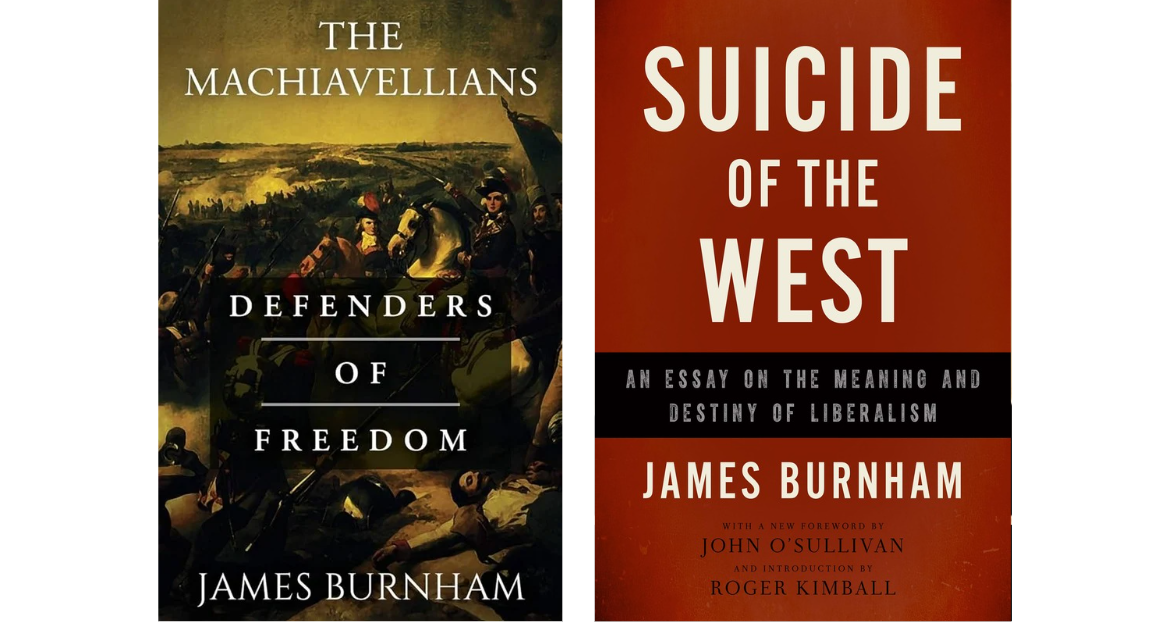American conservative political thinker, editor, and anticommunist theorist, James Burnham was part of the ex-communist Right that played a major role in defining American conservatism after World War II and for a generation afterwards. In this respect, he belongs in the same category as Whittaker Chambers, Frank S. Meyer, Max Eastman, Will Herberg, and others. As a senior editor of National Review from the time of its founding, and as the magazine’s chief writer on foreign affairs, Burnham was instrumental in moving conservatives away from “isolationism” and toward an internationalist (though not globalist) foreign policy centered on anticommunism. Yet Burnham was also a major political thinker apart from his writings on communism and foreign affairs. While the latter were probably the basis of his reputation during his lifetime, it is likely that his posthumous influence will increasingly reflect the importance of his “theory of the managerial revolution” and his “neo-Machiavellian” analysis of political and social affairs.
Burnham was born in Chicago, Illinois, on November 22, 1905, the son of Claude George Burnham, an English Catholic immigrant who died in 1928 as the wealthy vice president of the Burlington Railroad. Burnham attended Princeton University, where he was an editor of the Princeton Tiger and the Nassau Literary Review, and he graduated in 1927 with the highest academic average in his class. He studied at Balliol College, Oxford University, where he read English literature and took a B.A. with second class honors in 1929 and an M.A. in 1932. In 1934, he married Marcia Lightner, by whom he was the father of two sons and a daughter.
Burnham’s early interests were literary and philosophical. He joined the faculty of New York University’s Washington Square College in 1929 and taught philosophy there and at NYU until 1953. In 1932, Burnham and Philip Wheelwright published a textbook of philosophy, An Introduction to Philosophical Analysis, a highly skeptical treatment of both premodern and modern philosophical systems. From 1930 to 1933, he and Wheelwright edited a literary and philosophical journal, the Symposium. Burnham was one of the first literary critics to appreciate the genius of the young William Faulkner.
Burnham acquired an interest in politics during the Depression, and although he was at first highly critical of Marxism he became increasingly radical, influenced by Leon Trotsky’s History of the Russian Revolution (English translation, 1932) and by a trip across the United States in 1933 that showed him the misery created by the Depression. In that year he formed the American Workers Party (AWP) with A. J. Muste, and in 1934, Burnham and the AWP emerged with the American adherents of Trotsky in the Workers Party (which became in 1937 the Socialist Workers Party), with which Burnham was affiliated until 1940. He and Max Schachtman became editors of the party’s theoretical journal, the New International.
Burnham was a leading American disciple of Trotsky but broke with him because of Trotsky’s defense of the Soviet Union as a “deformed” workers’ state, even after Stalin’s invasion of Finland. After an extended literary controversy with Trotsky, he resigned from the SWP in 1940. In the following year Burnham published The Managerial Revolution, which grew out of his disenchantment with Marxism and became the foundation of all of Burnham’s later political thought.
During World War II, Burnham worked for the Office of Strategic Services (OSS), the parent of the Central Intelligence Agency, for which he also worked for some years, helping to plan the covert U.S. subversion of Mohammed Mossadegh in Iran and the installation of Shah Reza Pahlavi. He also was a founder and active leader of the American Committee for Cultural Freedom, the U.S. affiliate of the Congress for Cultural Freedom, which received funds from the CIA, and a contributor to the Freeman, the American Mercury, and Partisan Review, a leading New York literary review that published many of the ex-communist intellectuals of the 1940s and 1950s.
Burnham’s increasingly outspoken anticommunism, his criticisms of fellow intellectuals for their communist sympathies or appeasement proposals, and his refusal to denounce Senator Joseph McCarthy caused him to be increasingly isolated. In 1953, he resigned from the editorial board of Partisan Review and the faculty of NYU, and in 1955 he became associate (later senior) editor of National Review, with which he was affiliated for the remainder of his life. Burnham wrote a regular column, “The Third World War” (from 1970 titled “The Protracted Conflict”), as well as articles, book reviews, and editorials from 1955 until 1978, when a stroke impaired his memory and forced his retirement. In 1983, he was awarded the Ingersoll Prize for Scholarly Letters as well as the Presidential Medal of Freedom from President Ronald Reagan. He died of cancer on July 28, 1987, at his home in Kent, Connecticut, converting to Roman Catholicism on his deathbed after a life of agnosticism.
The major theme of Burnham’s political thought after 1940 was his emphasis on the emergence of a new ruling elite, the managerial class, and its implications for Western society. This new class, which he saw as replacing the old capitalist elite, rules through its control of the technical functions of economic production and political administration. Its aspiration is to consolidate total power through economic and social regimentation, exploitation of the masses against the capitalist or bourgeois elite, and global integration. Although Burnham’s original analysis of the managerial class was largely Marxist, his second book (and most important theoretical statement), The Machiavellians: Defenders of Freedom (1943), abandoned Marxism and recast the theory. “The Machiavellians” included Niccolo Machiavelli himself and four modern social and political theorists: Vilfredo Pareto, Gaetano Mosca, Roberto Michels, and Georges Sorel. The common bond of these writers was their belief that the rule of elites or dominant minorities is inevitable in human society and that therefore anything like “democracy,” egalitarianism, or real socialism is impossible. Another theme was that ideologies and governmental forms are in fact “myths,” “political formulas,” or “derivations” that disguise the real goals of the ruling classes and social groups that use them to justify their own power and interests. While democracy is not literally possible, Burnham and the Machiavellians argued, it is possible to establish a balance of powers within a ruling class to ensure that civil liberties, national independence, and cultural vitality flourish. It is these real social conflicts, not social harmony, that make civilized and free political life possible, but their existence is rare in human history, and the rise of managerial totalitarianism meant that their survival was unlikely.
Burnham’s view of communism was closely related to the theory of the managerial revolution. The Soviet Union was the most advanced managerial regime, and its new ruling class was seeking global power through subversion, aggression, and intimidation. Burnham wrote a tetralogy—The Struggle for the World (1947), The Coming Defeat of Communism (1950), Containment or Liberation? (1952), and The Web of Subversion (1954)—to analyze the global strategy of the Soviets, their penetration of the U.S. government, and the response of the West in countering the Soviet drive for power. His strategy was essentially that the United States, as the leading Western managerial power, should seek to establish its own global hegemony and the destruction of the communist regime in the Soviet Union. In addition to the Machiavellian theorists, Burnham also relied on the first six volumes of Arnold J. Toynbee’s Study of History (1934) and on the geopolitical theories of British geographer and strategist Sir Halford Mackinder to provide a conceptual framework for his anticommunist thought.
Burnham was originally almost brutally dispassionate in his own attitude toward the rise of a managerial regime in the United States, but he hoped that it would allow some degree of freedom to survive and would display more dynamism than the old capitalist (conservative) elite. But by the mid-1950s, he was skeptical of the managers’ ability to rule and to resist the communist challenge forcefully. In Congress and the American Tradition (1959), he analyzed the decline of congressional government and the rise of a powerful presidency as part of the managerial revolution in American government. Burnham argued that freedom could not survive if the managerial presidency became the chief locus of political power, and he defended the rights and powers of Congress against the enlarged executive branch. In his last book, Suicide of the West (1964), Burnham argued subtly that the managerial class had adopted an ideology of liberalism as its chief political formula and that the psychic and social dynamics of liberalism reflected the decline of the West. The new managerial class had failed to take up the challenge of external and internal leadership.
Burnham’s ideas have had a major influence on social and political thought. Peter Drucker, Milovan Djilas, Jacques Ellul, John Kenneth Galbraith, and Karl Wittfogel all acknowledged his influence on their own thought, and it is likely the theory of the managerial revolution influenced both C. Wright Mills’s “power elite” theory and Daniel Bell’s “post-industrial society” thesis. George Orwell’s Nineteen Eighty-Four (1949) was intended in part as a fictional projection of the kind of managerial regime Burnham described in The Managerial Revolution. Burnham’s importance as a thinker lies largely in four features of his thought: (1) his view of conflict and power as central in human society and determining the course of history—as opposed to ideas, moral values, religion, and other “spiritual” forces; (2) his secularist, historicist, pessimistic, and modernist vision of conservatism, as distinct from the antimodernist thought of most nonlibertarian theorists of the Right; (3) his formulation of a realistic anticommunist foreign policy that accepts the inevitability of international activism by the United States but firmly rejects a universalistic, antinational, and moralistic globalism; and (4) the theory of the managerial revolution itself, which offers the framework for a comprehensive interpretation of twentieth-century history from an anti-liberal and anti-Marxist perspective.
Further Reading
John P. Diggins, Up from Communism: Conservative Odysseys in American Intellectual History
Samuel T. Francis, Power and History: The Political Thought of James Burnham
Daniel Kelly, James Burnham and the Struggle for the World: A Life
This entry was originally published in American Conservatism: An Encyclopedia, p. 109.














